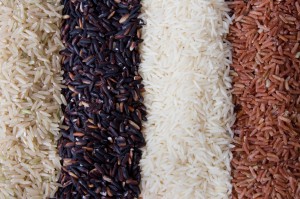 Is Organic Healthier?
Is Organic Healthier?
For the last two weeks, foodies, farmers, and scientists have been debating the validity of a study released by Stanford University about the nutritional quality of organic produce. The analysis concluded that organic foods grown without pesticides and other agro-chemicals, are not superior in quality to conventionally produced varieties.
I knew this study had to be flawed, but I just didn’t have the time to research the reasons, but last week I received a great email from Danielle Nierenberg of the Worldwatch Institute’s Nourishing the Planet project, outlining the many short comings of the study. Read her email re-posted in full on my blog.
BPA in Foods, Drinks Linked to Childhood Obesity
Add the risk of childhood obesity to the list of health ills that may be linked to the controversial chemical bisphenol A (BPA), a new study shows. BPA is used to manufacture many metal food and beverage cans. It may act as an endocrine disruptor in the body, meaning that it can affect hormone activity. In a new study, children with the highest levels of BPA in their urine were more than twice as likely to be obese as children who had the lowest levels. We often think of childhood obesity as a by-product of an unhealthy diet and lack of physical activity, but environmental exposures, including chemicals, may play a role. Parents can choose fresh fruits and vegetables to limit BPA exposure.
Occupy Wall Street: Unfortunately, The 1st Year Anniversary Didn’t Get the Response I had Hoped For
A year ago last week, the Occupy Wall Street movement got under way in Zuccotti Park in Lower Manhattan. The loose group of protesters, frustrated by the economic downturn, sought to blame Wall Street and corporate America for many of the nations ills. Now, 12 months later, can it be said that Occupy Wall Street was perhaps a fad? That is what this New York Times article is suggesting. I do not agree! Occupy Wall Street created an important national conversation about economic inequality, upward mobility and the 99%. I would hate to see it die out, and get negative press.
 Arsenic Found In Rice At High Levels
Arsenic Found In Rice At High Levels
Arsenic is found in a wide variety of rice and rice products, sometimes at levels that are higher than safe limits set for drinking water, new tests confirm. Based on tests of 60 products, Consumer Reports says kids and adults should watch how much rice they eat from various sources (like rice milk and rice cereal) to lower their exposure to arsenic, which has been linked to cancer, heart disease, and poor brain function in young children. At high levels, arsenic causes discoloration of the skin, stomach pain, nausea, vomiting, diarrhea, numbness, paralysis, and blindness.
Advice being given to consumers by the FDA (can we trust them?) is that they should continue to eat a balanced diet that includes a wide variety of grains, not only for good nutrition but also to minimize the potential consequences from consuming any one particular food. (This goes for all food!)
Environmental Working Group Launches “Guide to Healthy Cleaning”
With the launch of the Guide to Healthy Cleaning, Environmental Working Group (EWG) found that only two-dozen of the products they looked at from the $2.45 billion laundry detergent industry were what they’d call “safe” and “transparent” with their ingredients. Among the $906 million dish detergent sector, you get even less choice: they felt comfortable only recommending a mere 19 products. A shocking realization is that the main ingredient in one of the “naturally better” all-purpose cleaners they reviewed can react with ozone to form a known carcinogen. And one drain clog remover is at risk of “violently erupting”, potentially resulting in blindness and could be fatal if swallowed.

Comments are closed.